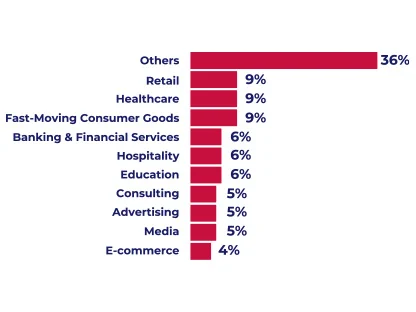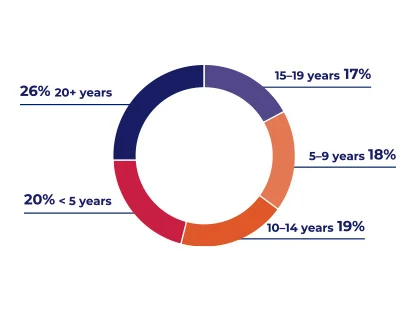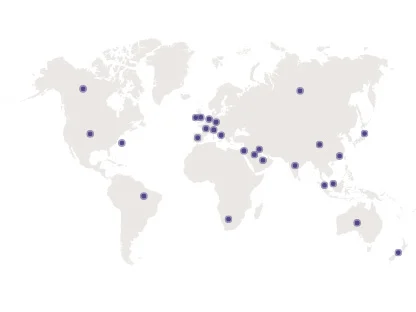
Mastering Digital Marketing in an AI World
Supercharge your digital marketing in an AI-driven world
As technology reshapes the dynamics of consumer–business interactions, organisations seek more effective ways to connect and communicate with their audiences. With the majority of businesses embracing digital platforms, nearly 50% lack a well-defined strategy. As a marketing professional, navigating this landscape requires not only an understanding of strategising but also leveraging the transformative power of new technology.
The Mastering Digital Marketing in an AI World course incorporates cutting-edge elements, including insights and activities that elevate practical understanding of generative AI (genAI) and other technologies to vastly improve customer-centric marketing. The comprehensive curriculum addresses the latest trends in digital marketing while taking you through case studies of best practices from renowned brands. The world-class faculty provides a unique learning experience by seamlessly blending the fundamentals of digital marketing with emergent technologies. The course will equip you with the skills to harness the potential of innovation in marketing, ensuring that your strategies align seamlessly with your organisation's goals.
67%
80%
87%
What you will learn
The Mastering Digital Marketing in an AI World course will equip you to:
Identify effective strategies related to paid search marketing, investigate organic search marketing strategies, understand B2B marketing and explore mobile app marketing strategies
Understand and apply the latest tools and techniques used in digital marketing
Analyse the consumer journey and create impactful digital marketing strategies
Learn and apply a comprehensive framework for connecting, converting and continuously engaging with consumers
Create a social media marketing plan to grow brand awareness and increase engagement and sales
Learn about strategies for content marketing, digital loyalty and personalisation marketing
Examine techniques used for social listening and acquire insights on methods for creating shareable content and motivating brand advocacy
Develop effective strategies for combining digital and physical marketing seamlessly into a single, cohesive omnichannel marketing strategy
Right for you?
Whether you are looking to enhance your skills in digital marketing or seeking a career transition from a non-marketing background, this course will provide you with the latest digital strategies and tools, including SEO, social media and genAI, to help you gain a big-picture perspective. This course is suitable for you if you are:
An experienced traditional marketer looking to adapt to the digital era and work with evolving technologies such as genAI
An early-career marketer keen to enhance your knowledge and practical application of digital marketing to stand out in a competitive market with AI-driven strategies
Any functional leader seeking a holistic view of the latest marketing trends, AI tools and strategies for building customer loyalty as a pathway to growth
A professional from a non-marketing field making a horizontal move to a focused marketing role or seeking deeper insights to diversify your career options with marketing automation

Proven results
See how our learners grew
79%
96%
81%
*Emeritus impact survey, 2023
Course content

Gain hands-on experience with a simulation project
Throughout the course, participants will work on a simulation project and gain hands-on experience by applying their learnings to an organisation in need of digital marketing assistance. Participants will use Stukent’s Mimic Pro, a digital marketing and social media simulation tool that provides the opportunity to manage ad budgets across search, display and shopping ad campaigns. It also provides insights on landing page optimisation, audience targeting and KPI analysis. Additionally, you will learn how to write targeted ads for multiple social media platforms, perform demographic targeting and implement social media strategies.
Your learning experience

Flexible learning
Access to course content through multiple devices allows you to manage schedules and learn remotely – anytime, anywhere.

Simulation exercises
Weekly marketing simulations are designed to give you practice managing your overall marketing mix and individual campaigns.

Real-world case studies
Case studies feature some of the world’s most prominent brands, including Starbucks, Coca-Cola, Lego, Cisco, TRSB and L'Oréal.

Peer interactions
Peer learning – in the form of discussion forums and surveys – allows you to track your progress.

Live sessions
Video lectures and live teaching sessions with Q&As create an immersive and engaging learning environment, which can be accessed from outside the classroom.

Interactive platform
Our unique platform allows users to create a profile, connect and collaborate with peers and interact live with subject-matter experts who will facilitate your learning.
Experts in the field

Adjunct Professor of Marketing, London Business School
Professor Lil Mohan is an entrepreneur and an academic. As Adjunct Professor of Marketing at London Business School, he covers several topics, including digital, social media,...

Professor of Marketing
Professor Anja Lambrecht’s research focuses on digital marketing, with a particular emphasis on online targeting and advertising as well as promotion and pricing. She has exam...

Adjunct Professor of Marketing
Professor David Arnold’s research focuses on global versus local marketing, marketing strategy, innovation and market evolution, brand management and global customer managemen...
Testimonials

Certificate
Upon successful completion of the course, you'll earn a digital certificate of completion from London Business School.
All certificate images are for illustrative purposes only and may be subject to change at the discretion of London Business School.
This online certificate course does not grant academic credit or a degree from London Business School.
FAQs
Didn't find what you were looking for? Write to us at learner.success@emeritus.org or Schedule a call with one of our Course Advisers or call us at +44 203 828 7359 (UK) / +65 3135 1096 (SG) / +1 315 517 3638 (US)
Flexible payment options available.
Starts On



